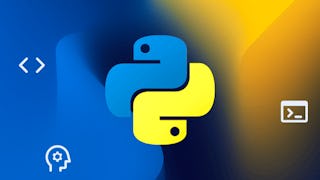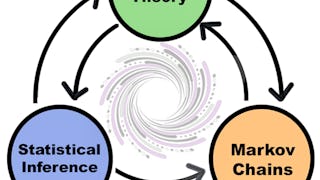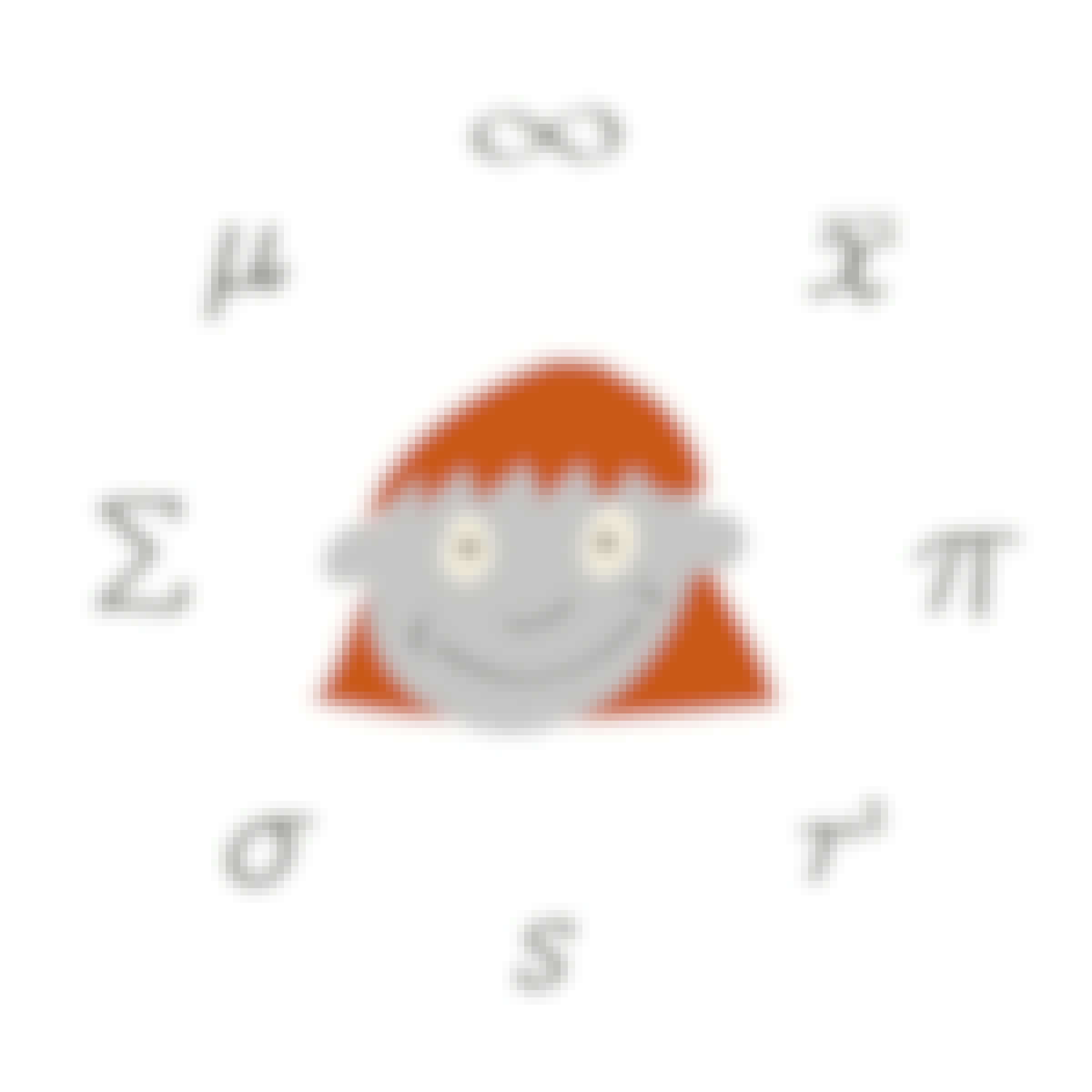- Browse
- Advanced Statistics
Results for "advanced statistics"
 Status: Free TrialFree TrialJ
Status: Free TrialFree TrialJJohns Hopkins University
Skills you'll gain: Statistical Hypothesis Testing, Sampling (Statistics), Regression Analysis, Bayesian Statistics, Statistical Analysis, Probability & Statistics, Statistical Inference, Statistical Methods, Statistical Modeling, Linear Algebra, Probability, R Programming, Biostatistics, Data Science, Statistics, Probability Distribution, Mathematical Modeling, Data Analysis, Applied Mathematics, Predictive Modeling
4.4·Rating, 4.4 out of 5 stars781 reviewsAdvanced · Specialization · 3 - 6 Months
 Status: Free TrialFree TrialU
Status: Free TrialFree TrialUUniversity of Michigan
Skills you'll gain: Sampling (Statistics), Statistical Hypothesis Testing, Statistical Modeling, Statistical Methods, Statistical Inference, Data Visualization, Descriptive Statistics, Bayesian Statistics, Data Visualization Software, Jupyter, Histogram, Statistical Software, Probability & Statistics, Matplotlib, Statistical Analysis, Statistics, Data Analysis, Box Plots, Statistical Programming, Python Programming
4.6·Rating, 4.6 out of 5 stars3.3K reviewsBeginner · Specialization · 1 - 3 Months
 Status: NewNewStatus: PreviewPreviewO
Status: NewNewStatus: PreviewPreviewOO.P. Jindal Global University
Skills you'll gain: Sampling (Statistics), Statistical Analysis, Probability Distribution, Statistical Hypothesis Testing, Descriptive Statistics, Statistical Methods, Correlation Analysis, Regression Analysis, R (Software), R Programming, Statistical Modeling, Statistical Inference, Probability, Big Data, Decision Tree Learning
Build toward a degree
Mixed · Course · 1 - 3 Months
 Status: Free TrialFree TrialI
Status: Free TrialFree TrialIIllinois Tech
Skills you'll gain: Machine Learning Algorithms, Statistical Analysis, Bayesian Statistics, Statistical Inference, Data Visualization, Exploratory Data Analysis, Data Cleansing, Regression Analysis, Analytics, Data Analysis, Machine Learning, Statistical Modeling, R Programming, Data Science, Data Manipulation, R (Software), Data Mining, Statistical Programming, Data Validation, Feature Engineering
Build toward a degree
4.5·Rating, 4.5 out of 5 stars45 reviewsIntermediate · Specialization · 3 - 6 Months
 Status: NewNewStatus: Free TrialFree TrialU
Status: NewNewStatus: Free TrialFree TrialUUniversity of Colorado Boulder
Skills you'll gain: Probability, Probability & Statistics, Estimation, Probability Distribution, Markov Model, Bayesian Statistics, Statistical Methods, Statistical Inference, Sampling (Statistics), Statistical Analysis, Statistics, Artificial Intelligence, Generative AI, Data Analysis, Data Science, Descriptive Statistics, Machine Learning Algorithms, Mathematical Theory & Analysis
Build toward a degree
4.4·Rating, 4.4 out of 5 stars320 reviewsIntermediate · Specialization · 3 - 6 Months
 Status: Free TrialFree TrialG
Status: Free TrialFree TrialGGoogle
Skills you'll gain: Sampling (Statistics), Descriptive Statistics, Statistical Hypothesis Testing, Data Analysis, Probability Distribution, Statistics, Data Science, Statistical Analysis, A/B Testing, Statistical Methods, Probability, Statistical Inference, Statistical Programming, Python Programming, Technical Communication
4.8·Rating, 4.8 out of 5 stars853 reviewsAdvanced · Course · 1 - 3 Months
What brings you to Coursera today?
 Status: Free TrialFree TrialV
Status: Free TrialFree TrialVVanderbilt University
Skills you'll gain: Prompt Engineering, Data Presentation, ChatGPT, Document Management, Artificial Intelligence, Problem Solving, Data Analysis, Information Management, File Management, Creativity, Data Processing, Automation
4.8·Rating, 4.8 out of 5 stars922 reviewsBeginner · Course · 1 - 3 Months
 Status: Free TrialFree TrialU
Status: Free TrialFree TrialUUniversity of Colorado Boulder
Skills you'll gain: Data Storytelling, Data Presentation, Data Governance, Predictive Modeling, Data Storage Technologies, Predictive Analytics, Exploratory Data Analysis, Analytics, Business Analytics, Data Storage, Big Data, Risk Analysis, Databases, Business Intelligence, Data Visualization, Data Visualization Software, Data Analysis, Decision Making, Data Cleansing, SQL
4.6·Rating, 4.6 out of 5 stars5.2K reviewsIntermediate · Specialization · 3 - 6 Months
 Status: NewNewStatus: Free TrialFree TrialM
Status: NewNewStatus: Free TrialFree TrialMMacquarie University
Skills you'll gain: Data-Driven Decision-Making, Microsoft Excel, Forecasting, Regression Analysis, Business Analytics, Statistical Analysis, Data Analysis Software, Time Series Analysis and Forecasting, Analytics, Data Visualization, Statistical Methods, Advanced Analytics, Data Analysis, Statistics, Probability & Statistics, Statistical Inference, Statistical Modeling, Variance Analysis
4.7·Rating, 4.7 out of 5 stars20 reviewsAdvanced · Course · 1 - 3 Months
 Status: Free TrialFree TrialU
Status: Free TrialFree TrialUUniversity of Amsterdam
Skills you'll gain: Statistical Hypothesis Testing, Statistics, Scientific Methods, Quantitative Research, Data Analysis Software
4.6·Rating, 4.6 out of 5 stars4.6K reviewsBeginner · Course · 1 - 3 Months
 Status: NewNewStatus: Free TrialFree Trial
Status: NewNewStatus: Free TrialFree TrialSkills you'll gain: Regression Analysis, Statistical Analysis, Time Series Analysis and Forecasting, R Programming, Statistical Hypothesis Testing, Probability & Statistics, Trend Analysis, Statistical Modeling, R (Software), Statistics, Predictive Modeling, Generative AI, Statistical Inference, Forecasting, Descriptive Statistics, Power BI
Beginner · Course · 1 - 3 Months
 Status: Free TrialFree TrialI
Status: Free TrialFree TrialIIllinois Tech
Skills you'll gain: Statistical Analysis, Data Analysis, Statistical Programming, Statistical Methods, Statistical Machine Learning, Regression Analysis, Supervised Learning, Statistical Inference, Machine Learning, Unsupervised Learning, Predictive Modeling, Classification And Regression Tree (CART), Feature Engineering, Dimensionality Reduction
Build toward a degree
4.5·Rating, 4.5 out of 5 stars8 reviewsIntermediate · Course · 1 - 3 Months
Searches related to advanced statistics
In summary, here are 10 of our most popular advanced statistics courses
- Advanced Statistics for Data Science: Johns Hopkins University
- Statistics with Python: University of Michigan
- Statistical Methods and Data Analysis : O.P. Jindal Global University
- Advanced Statistical Techniques for Data Science: Illinois Tech
- Foundations of Probability and Statistics: University of Colorado Boulder
- The Power of Statistics: Google
- ChatGPT Advanced Data Analysis: Vanderbilt University
- Advanced Business Analytics: University of Colorado Boulder
- Statistics and Data Analysis with Excel: Advanced: Macquarie University
- Basic Statistics: University of Amsterdam
Frequently Asked Questions about Advanced Statistics
Advanced statistics are the mathematical tools used to discover and explore complex relationships between different variables in large datasets. In contrast to basic statistics such as average and analysis of variance (ANOVA) that simply describe the characteristics of a dataset, advanced statistical approaches often seek to make predictions about the world. This requires the use of more sophisticated statistical inference tools, such as generalized linear models for regression analysis capable of establishing how multiple interrelated factors may impact projected outcomes.
These advanced statistical methods are increasingly important in the field of data science, which is tasked with uncovering important business insights and developing predictive models from diverse big data-scale datasets. These techniques are also especially important for the proper training and use of machine learning algorithms. As in data science and machine learning more generally, R programming and Python programming skills are typically relied upon to conduct these advanced statistical analyses.
Advanced statistics skills are essential for work in data science, machine learning, and artificial intelligence (AI), as statistical approaches are at the heart of the learning algorithms that make these applications possible. An understanding of statistics is likewise important for professionals in finance, healthcare, and other industries that are increasingly making use of machine learning and AI, as they increasingly need to work closely with data scientists to ensure that these powerful techniques are developed to solve the right business problems.
Those wishing to delve deeper into advanced statistical methods and help develop new mathematical approaches in the field may pursue a master’s or even a PhD in statistics. These experts work in academia, government, or at private sector companies involved in scientific or engineering research. According to the Bureau of Labor Statistics, professional statisticians earn a median annual salary of $91,160, and this specialized career path is expected to be in high demand due to expanding opportunities to use statistics to navigate our data-rich world.
Certainly. Coursera offers a variety of courses in advanced statistics as well as their applications in the context of fields like data science and machine learning. In fact, coursework in statistics is often a prerequisite for data science classes. Regardless of your level of expertise and needs in these areas, Coursera enables you to learn remotely from top-ranked schools like the University of Michigan, Johns Hopkins University, and Duke University. And, since you can view course materials and complete coursework on a flexible schedule, there’s an exceedingly high probability that you can fit online learning about advanced statistics into your existing school or work life.
You need to have strong math skills, especially in basic calculus, linear algebra, and statistics before starting to learn advanced statistics. It's important that you have strong technical skills and are very comfortable on the computer, strong analytical skills, and the ability to carefully examine and question data that is presented to you so that you can organize and draw conclusions from it. For learning some concepts in advanced statistics, you'll need to have experience using the R statistical software package and understand Bayesian estimation, principles of maximum-likelihood estimation, and calculus-based probability.
People who enjoy mathematics are best suited for roles in advanced statistics, especially those who enjoy concepts like probability, linear models, and statistics and how they relate to data science. They can quickly grasp and apply complex technical concepts as well. Those who enjoy testing hypotheses and figuring out uncertain outcomes based on probability are also well suited for roles in advanced statistics. Also, people who have wide-ranging computer skills, the ability to communicate their statistical findings in plain language, problem-solving and analytical skills, and teamwork and collaborative skills are best suited for roles involving advanced statistics.
If you're aspiring to be a biostatistician or data scientist, learning advanced statistics is probably right for you. If you're interested in machine learning and the development of data products, you may also find learning advanced statistics is right for you. People who want to have a career as a statistician, statistical epidemiologist, sports analyst, actuary, market researcher, or investment analyst may also find learning advanced statistics to be the right choice. And if you need to understand how to transform complex sets of data into practical applications, learning advanced statistics is right for you.










